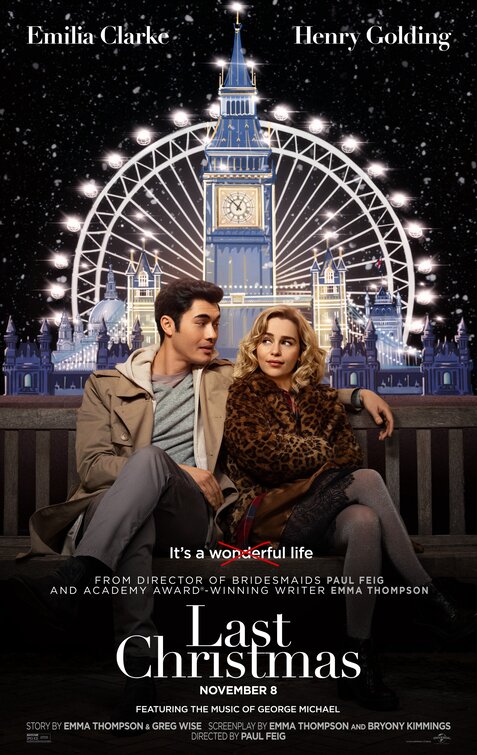by Chris Feil
 A sure signal of the coming holiday season at the movies is the arrival of unpretentious lighter fare like Last Christmas. This year’s offering falls in line with the easy charms of such previous entries as The Holiday and Almost Christmas, but also arrives with a somewhat affably strange lump of ingredients. Inspired by the Wham! song and packed with a slew of George Michael songs, the Paul Feig-directed film is co-written by Emma Thompson (with Bryony Kimmings and Greg Wise) and offers up timely context within a classic romcom structure. It’s a sugar high of a movie that remains grounded in some substance, not exactly tidy but satisfyingly more than meets the eye.
A sure signal of the coming holiday season at the movies is the arrival of unpretentious lighter fare like Last Christmas. This year’s offering falls in line with the easy charms of such previous entries as The Holiday and Almost Christmas, but also arrives with a somewhat affably strange lump of ingredients. Inspired by the Wham! song and packed with a slew of George Michael songs, the Paul Feig-directed film is co-written by Emma Thompson (with Bryony Kimmings and Greg Wise) and offers up timely context within a classic romcom structure. It’s a sugar high of a movie that remains grounded in some substance, not exactly tidy but satisfyingly more than meets the eye.
Emilia Clarke plays the disillusioned would-be singer and Yugoslavian immigrant Kate, couch-hopping between friends that she quickly burns out with carelessness and working in a Christmas-themed giftshop. She avoids her family, particularly her domineering mother (also played by Thompson), and is increasingly testing the patience of her demanding but doting boss (Michelle Yeoh). Kate’s self-destructiveness comes after a serious illness has left her not with renewed gratitude, but with a diminished sense of self she has internalized into constant misbehavior. But her main challenger in the struggle comes when a charming man on a bike named Tom (Henry Golding) wanders in and out of her life.
Clarke is quite charming and convincing with Kate’s caustic avoidance tactics and sublimated shame, not overdoing the potential for over-antics as she has in previous romantic outings. Opposite both Thompson and Golding, she smoothly juggles between the film’s romantic and family tension elements as it becomes more of a character study about getting your shit together. Golding is a subtly ironic romantic leading man, coyly self-aware of his good looks in humorous, but never pompous charm. But as a writer, Thompson saves the funniest and sweetest stretches for herself and Yeoh, a warm duet of maternal roles who miss the best in Kate while claiming their own worth.

The film is fatally hindered by its painfully obvious twist (not helped in the least by marketing that seems insistent on declaring it via blaring foghorn) that takes a shockingly long time to reveal itself. But the real surprise of the film is its nature, one that is more rewarding in how it slowly reveals itself to the audience. Last Christmas has all of the ornamentation of a traditional romantic comedy farce, but its mostly a deceptive packaging for another depression comedy from Paul Feig. Though not nearly as incisive and much more intentionally cozy than Bridesmaids was, the director knows something about molding an uplifting comedy about the process of digging oneself out of despair.
Also at the core of the film is a post-Brexit story of a family of (albeit, white) immigrants coping with an increasingly hostile world, reconciling as a unit through each member owning their own identities. The film is ultimately a fantasy informed by pop confections alongside our current reality, incorporating concerns of xenophobia and economic inequity in ways that forces mainstream audiences to grapple with them while also allowing for some hope. It’s not pushing an envelope, but it is rewarding to see a film many might shrug off as a trifle still attempt to incorporate these elements.

But for as much as Last Christmas is overstuffed and sometimes distracted by its pieces, the whole makes for a digestible and mindfully-intended dose of goodwill. If not a great romantic comedy, it belongs in the tradition of ones where the love story is merely a vessel for a more compelling human one.
Grade: B-